English, Math Exams: Lack of quality teachers behind poor show
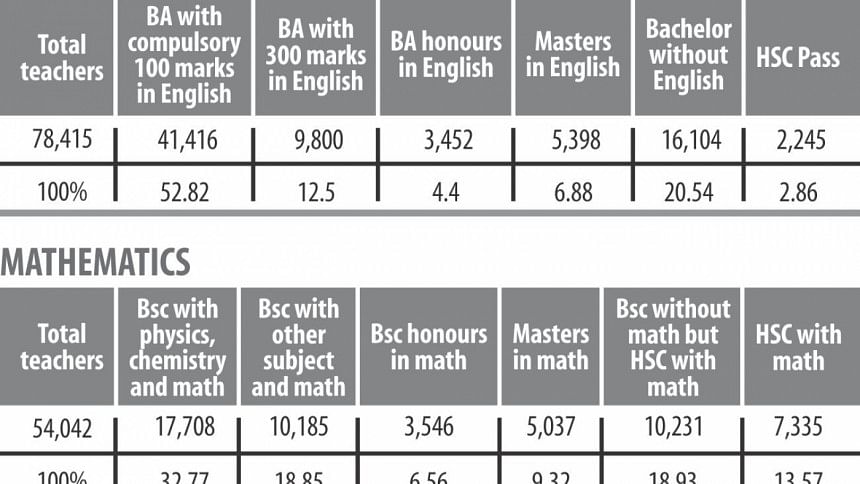
The success rate fall in the JSC examinations has once again exposed students' weakness in English and mathematics -- two key subjects that always make a difference in the pass rate.
But a lack of qualified teachers specialising in English and maths at the secondary schools is also to blame for this situation prevailing in the country for years, said experts and educationists.
According to the latest government report, around 88 percent of the 78,415 teachers giving English lessons at secondary level did not study English as a core subject in graduation and master's levels.
Only 4.4 percent have done BA (honours) in English while 6.88 percent master's in English, said Bangladesh Education Statistics 2016 of Bangladesh Bureau of Educational Information and Statistics (Banbeis).
More than half of the English teachers had only a 100-mark compulsory English language course. About 20.54 percent completed bachelor degree without studying English as the main subject and 2.58 percent studied the subject last time in their HSC level, said the report, released in May 2017.
The situation in maths is similar.
Of the 54,042 maths teachers, only 15.88 had BSc honours and master's in this subject. Some 13.57 percent had this subject in their HSC level and about 33 percent had maths along with other subjects -- Physics and Chemistry -- in BSc level.
Educationists say children are not acquiring the required base in English and maths for a lack of skilled teachers. Also, the training teachers are getting is far from adequate.
All this impacts the results of most public examinations like SSC and HSC every year. The latest JSC exam also had this reflection.
The pass rate in the Junior School Certificate (JSC) exams under the eight general education boards dropped to 83.10 percent, a 9.79 percentage points fall from that of the previous year.
Officials and teachers said poor show in English and maths contributed to this.
In Comilla Board, for example, 21.38 percent students failed in English and 14.59 percent in maths. The overall pass rate under this board is 62.83 percent, the lowest in the eight general boards.
And the sharp fall in the success rate of this board pushed down the overall pass rate.
Prof Md Abdus Salam, acting chairman of Comilla Board, acknowledged that the shortage of good English and maths teachers in rural areas might be the reason for this drop.
Students in Dhaka, Jessore and Chittagong boards also performed badly in these two subjects, according to the results published on Saturday.
"English and mathematics are associated with skills. It may be possible to teach subjects like Bangla for a teacher who majored in other subjects. But it is not possible to teach English and mathematics for an alternative teacher,” said renowned educationist Rasheda K Choudhury.
The lack of skilled and subject-based teachers is a major problem particularly in rural areas, where most schools are non-government schools, she said.
"In developed countries, you won't be allowed to enter classroom without proper training. You have to take part in a test to prove your skill and quality before being registered as a teacher. This is absent in our education sector," said Rasheda, also the executive director of Campaign for Popular Education (CAMPE).
Many of those who teach English and maths in schools do not have the required qualities, said Prof Siddiqur Rahman, former director of Education Research Institute of Dhaka University.
"Having a BSc degree does not necessarily mean he [the teacher] will be able to teach all subjects in Science Group properly.
"To be a good teacher, he or she must have commitment for teaching, degree and in-depth knowledge on specific subjects and knowledge on the teaching method, which is absent in case of many teachers," he said.
About the lack of quality teachers, he said teaching profession was the last choice for many due to poor salaries and other benefits as well as a sharp decline in their social status.
Those who complete honours in English and maths usually do not come to teaching in schools, he said.
Prof Siddiqur, a member of the national education policy formulation committee-2010, said they gave several recommendations, including a separate pay scale for teachers and formation of teachers' service commission for recruitment, but to no avail.
Contacted, Prof Wahiduzzaman, director general of the Directorate of Secondary and Higher Education, which looks after secondary education, admitted that there was a lack of teachers and that training programmes were not adequate.
"In remote areas, there is a shortage of English, maths and science teachers. It's obvious that this will have an impact on what the students are learning,” he said.
He said their assessment showed that most students performed poorly in these three subjects and so they had been appointing three additional teachers of these subjects for the last few years.
"And we are getting some positive results," he said.
About training, Prof Wahiduzzaman said they were arranging training for the teachers at home and abroad, but still they could not train all the teachers as the number was huge. “We are trying our best."
There are 20,449 secondary schools in the country where more than 2.43 lakh teachers teach around 1.01 crore students, said the Banbeis report.


 For all latest news, follow The Daily Star's Google News channel.
For all latest news, follow The Daily Star's Google News channel. 

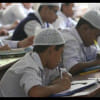
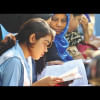

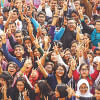
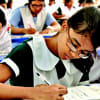


Comments